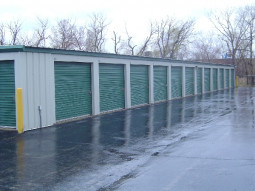Chicago Area Self-Storage Appraisal For Tax Appeal Purposes

Chicago area self-storage facility appraisal for ad valorem (or real estate tax) purposes requires a distinctly different perspective than an appraisal made for bank financing or for the self-storage facility’s use value as part of a going concern. In Chicago and Cook County Illinois, ad valorem property tax assessments must reflect the value of the real estate only and should not include any business value. But as the self-storage industry expands into an ever greater variety of commercial activities, aspects of the self-storage business enterprise and the real estate on which the business is conducted are becoming increasingly intertwined. Failure to properly separate the business activities from the real estate may result in over-assessment. Chicago area commercial tax appraisers need to be knowledgeable and diligent about removing business consideration for self-storage appraisals.
The self-storage industry’s origin dates to the 1960s when several pioneers began developing a product giving individual renters control of their own access to locked storage units. At first, the industry grew slowly; however construction of facilities accelerated in the 1990s due to burgeoning demand. Today there are some 50,000 self-storage facilities operating in the United States. During stronger economic times as many as 4,000 or 5,000 facilities were being developed each year. Due to the recession, that number dwindled to about 200 in 2010.
As the industry has evolved, operators have expanded into many specialty markets such as boat and RV storage, wine storage, records storage among other activities. Many facilities are also becoming more retail oriented with larger spaces dedicated to the sale of products such as boxes, locks, moving supplies, shelving and other storage related goods. In 2009 for example, about 29% of self-storage facilities had truck storage rentals, 76% offered ancillary products for sale and 39% provided customer storage insurance. Self-storage property sales are based on the profitability of the business enterprise. A property tax assessment should not increase because a particular operator has a successful business model or is good at selling insurance or at operating a truck rental business. When property sales occur, often as not, the price reported includes other aspects of the going concern over and above just the real estate. A commercial tax appraiser needs to be cognizant of these issues.
The self-storage market remains highly fragmented with the top ten firms controlling only about 13% percent of all self-storage facilities; however, an emerging trend is for the major self-storage brands to accept third-party management assignments. Three of the four publicly traded self-storage REITs – Sovran, U-Store-It and Excess Space are pursuing third-party management to grow their portfolios. Typically these companies will “reflag” the property they manage, allowing them to grow without extra capital costs. It is widely reported in industry journals that the larger firms generally have higher occupancy levels and a more sophisticated marketing and internet services that can draw business away from smaller users. They are also generally more sophisticated in maximizing pricing. As with the hotel industry, it is proper to ask how much of self-storage property value is attributable to the “flag” versus the real estate when completing a commercial tax appraisal.
It is becoming apparent that an increasing proportion of a self-storage facility’s transaction price property value is derived from the business operation rather than the real property. Various profit centers from insurance, truck rentals, retail sales and self-storage flagging are changing the nature of the business. When appraising the value-in-exchange for assessment purposes the best way to account for these business attributes is in the income capitalization approach. Comparable building sales would tend to reflect the value-in-use as a going concern and not the value of the real estate. Relying on self-storage property sales to set value levels would generally result in over-appraisal of self-storage facilities. Cook County and Chicago area assessments may only reflect real estate only and not business value. Your Chicago area commercial tax appraiser needs to be aware of these issues for a fair and equitable valuation of self-storage properties for property assessment purposes.



